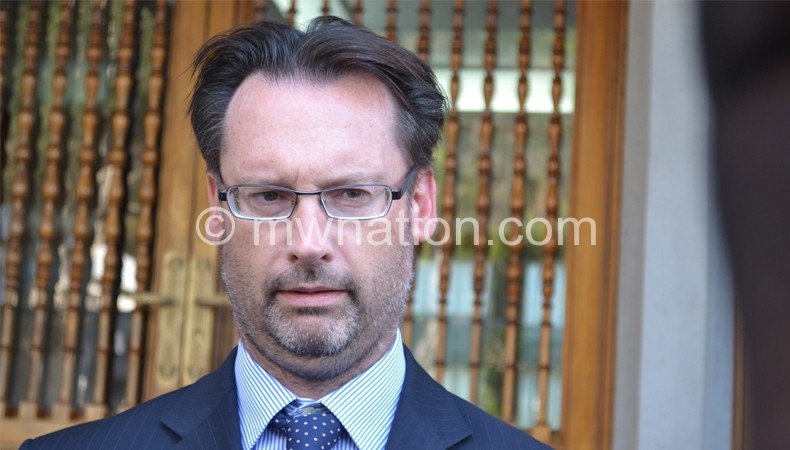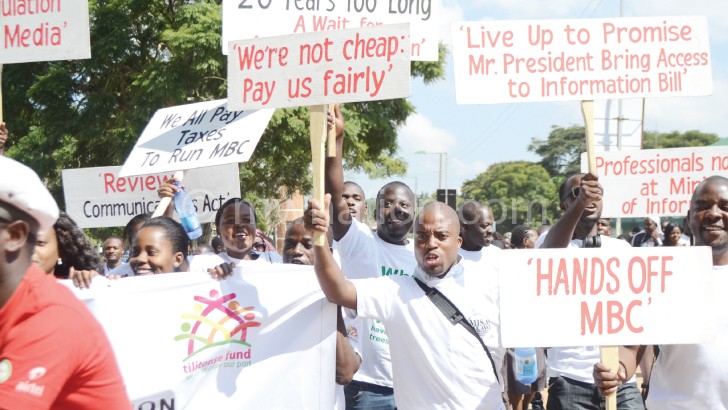Journalists get mixed rating
Malawian journalists will today, May 3, join their colleagues across the globe in commemorating World Press Freedom Day, the day the United Nations set aside to reflect on challenges and successes in the media.
In interviews ahead of the day, most news sources have given the local media—newspapers, radio and television stations and online media—a top rating of “vibrant”.

This rating kept cropping up among commentators who were asked to rate the performance of the Malawi media. They had to choose from a rating multiple choice of: Very vibrant, vibrant, basic, struggling and poor.
However, only governing Democratic Progressive Party (DPP) spokesperson Francis Kasaila lowered the rating of the local media to “Basic.”
The questionnaire mainly targetted several academics, politicians and officials in civil society organisations (CSOs).

Diplomats were also sampled and British High Commissioner Michael Nevin, who responded, also rated the Malawi media as “vibrant”.
He said his rating comes in the face of the difficult economic environment journalists are working in.
“Without the media, and it is good that it has been liberalised over the last few years, Malawi [can] lose any vitality it has,” said Nevin.
On how Malawi’s media products compare with those on the international scene, particularly in neighbouring countries, the envoy said it was a fair game.
“Not bad. I can compare with Kenya. I think the TV [television] media, at least, has some way to go to meet Kenyan standards, but Malawi is not far behind in print. I would encourage better online resources by media houses, as they are often not up to date,” said Nevin.
He also responded in the affirmative to the question of whether he is impressed with how news reporters highlight and unpack national issues and how they break news and follow-up on stories.
Said Nevin: “In general, I think they [journalists] are much better than they are given credit for. They have a sense why an issue is important to highlight. Cashgate, for example, may not have been exposed the way it was, if not for the media.
“There is, perhaps, less analytical focus. The nuances are sometimes not thought of and the reported story, rather than what the story means, sometimes gets lost. But I am a firm believer that the media here are one of the strongest institutions in Malawi’s democracy and accountability landscape. And it seems it is good to be a journalist here, as everyone likes to tell journalist a lot!”
The other commentators who gave the media the thumbs up are Boniface Dulani, a political and social analyst, based at the University of Malawi’s Chancellor College, Consumers Association of Malawi (Cama) executive director John Kapito and Malawi Economic Justice Network (Mejn) executive director Dalitso Kubalasa.
Among other things, Dulani said reporters engage him very frequently.
He said: “On average, I would say I give anywhere between 10 to 20 interviews per week. Most callers are courteous. The only frustration is when some reporters insist that they want to talk to you even after you tell them you are busy. Unfortunately, it is not always possible to respond to each interview request.
“Perhaps the oddest place was on June 21 2015 when we were burying my grandfather. I got several ‘phone calls from the same reporter, while we were at the cemetery; he was seeking an interview. Naturally, I cut the call and switched off the ‘phone, without answering.”
Dulani explains that his rating of the media is slightly different.
“For the private media, I will say vibrant. There is a great effort to balance stories and to get independent commentary. Unfortunately, the public media gets a ‘poor’ rating from me. The news is [sometimes] stale and not appealing at all. Even if I were a ruling party supporter, I would feel very embarrassed by the poor quality and bias that passes as journalism in the public media!” he states.
On how the Malawi media fares internationally, he intones:
“I believe our media compares favourably to our neighbours. I would actually say we are a lot more vibrant compared to our neighbours in Tanzania and Mozambique.
“Where we are lacking, perhaps, is our inability to look back at what our leaders said in the past and how that compares to what they are promising now. This also goes for analysts like myself, who say one thing today and the complete opposite tomorrow.”
On his parting shot, Dulani said: “Keep up the good work and let us continue to hold the government accountable. Ooh, and let’s not relent on fighting for the enactment of the Access to Information Bill.”
Kapito, who was the fastest respondent, providing answers within two hours, gave an initial acidic reflection initially.
“I find 40 percent of the reporters’ questions are not professional. There are times you have to educate some reporters on the issues they ask about and a few reporters are not courteous enough.
“They fail to indicate their names and institutions they represent. And they have no respect concerning the times and places they should approach one, irrespective of one’s request for them to call or meet at a specified place and time,” he said.
The activist, who says he is interviewed on a daily basis, laments that most journalists rigidly take prescribed angles to their stories and merely use commentators to endorse those angles.
Kapito noted lack of specialisation as one challenge that hampers journalists’ ability to analyse issues.
Giving his thumbs up to the media, in response to offering “credit where it is due,” Kubalasa expresses joy that despite constraints and difficult situations, the reporters do a great job.
“They have been very organised and impressive, to a great extent. They have been one of the most important watchdogs and whistleblowers, with a critical role to effectively yield even greater development impact and results for the country,” he states.
He, however, points out that some reporters need to be sharpened by on-job training in order to reach expected levels. Media houses, themselves, need to up their game in ensuring that professional gaps are closed urgently, he adds.
For his parting words, Kubalasa stresses the need for media houses and other stakeholders to invest towards a truly vibrant media to uphold integrity and matured reporting that will help build a nation of integrity.
“We, perhaps, need to carefully and progressively rise above the din of ‘victim mentality’and do our level best to invest in capacity building of the media both from the individual and institutional perspectives,” he said.
In his response that reflected less glow for the Malawi media, Kasaila, who said he is interviewed as many as 30 times in a week, feels media house owners contribute to his rating.
“Media houses, in my opinion, are not investing in the development of their staff. They just want them to perform and it has been left to individuals to work on their professional development,” he said.
Kasaila, who is also Minister of Foreign Affairs and International Cooperation, finds fault over how information he has given out to the media is used, especially by the print media.
He said: “In most cases, I feel that the reporter only wanted an authority to use my name. Most reporters would have their own position and even after providing facts [to the contrary], they are not willing to change their positions.





